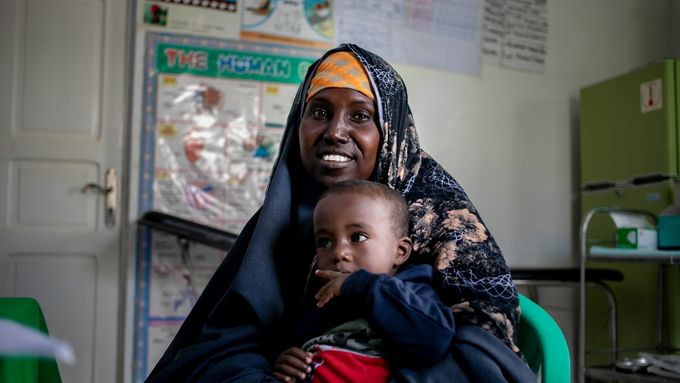New Digital Health Tool Improves Care for Children in Somalia
12.12.2024
A new study demonstrates how the digital clinical decision support system ALMANACH (Algorithm for the Management of Childhood Illness) is transforming healthcare for children under five in Somalia. Key findings include a 72% reduction in overall antibiotic prescriptions, falling from 58% to just 16%, and significant improvements in the quality of care. Conducted by Swiss TPH, the International Committee of the Red Cross (ICRC) and the Somali Red Crescent Society (SRCS), the study was published in Oxford Open Digital Health.

The ALMANACH project demonstrates the power of digital health solutions to overcome barriers and improve quality of care in conflict-affected and resource-constrained settings. (Photo: ICRC)
Tackling Somalia's child health crisis
Somalia has one of the world’s highest child mortality rates, driven by decades of conflict, drought, and a fragile healthcare system. Preventable diseases like pneumonia, diarrhea, and malaria are the leading causes of death among children under five. However, healthcare delivery is hindered by inadequate infrastructure, displacement, and a shortage of trained medical personnel.
The World Health Organization’s Integrated Management of Childhood Illness (IMCI) guidelines aim to reduce child mortality, but implementation has been inconsistent, especially in conflict-affected regions. To address these gaps, Swiss TPH and partners introduced ALMANACH, a digital tool that guides healthcare workers step-by-step through consultations to ensure consistent application of IMCI protocols.
Notable improvements in care
In a new study published in the Oxford Open Digital Health, results show that ALMANACH is transforming healthcare for children under five in Somalia.
The study, conducted in seven health facilities in South-Central Somalia and encompassing over 1,200 consultations, revealed striking improvements in healthcare practices following the implementation of ALMANACH:
- Antibiotic prescriptions: Overall prescriptions decreased by 72% (from 58% before to 16% after implementation), and inappropriate prescriptions for upper respiratory tract infections were nearly eliminated (from 97% before to 3% after implementation)
- Danger sign detection: Improved dramatically, from 1% correct adherence to 99%
- Follow-up counseling: Increased from 12% to 94%
- Vitamin A supplementation checks: Rose from 20% to 96%
Both healthcare providers and caregivers noted improvements in the quality and reliability of care. “ALMANACH equips frontline health workers with tailored recommendations that enhance decision-making and improve the quality of care, even in challenging environments,” said Anja Junker, Clinical Project coordinator at Swiss TPH.
Reducing antibiotic overuse
Antimicrobial resistance is a growing global threat, worsened by the overuse of antibiotics. ALMANACH addresses this issue by ensuring antibiotics are prescribed only when clinically necessary.
“Antibiotic misuse is a critical issue, especially in fragile health systems,” said Eveline Hürlimann, senior scientific collaborator at Swiss TPH. “By providing precise, evidence-based recommendations, ALMANACH helps protect patients and reduce community-level risks.”
This reduction in unnecessary prescriptions highlights ALMANACH’s potential to improve care while mitigating the risks associated with antibiotic overuse – a critical step toward scalable global health solutions.
A Blueprint for fragile health systems
The success of ALMANACH demonstrates how digital tools can transform healthcare in fragile and resource-limited settings. By reducing unnecessary antibiotic prescriptions and improving adherence to care guidelines, ALMANACH sets a new standard for addressing critical healthcare challenges worldwide.
“This project showcases the power of digital health solutions to overcome barriers and enhance care quality in conflict-affected and resource-constrained settings,” said Junker.
The collaboration between Swiss TPH, ICRC and SRCS provides a model for scaling similar interventions in region s where healthcare systems are under strain, ensuring better access to care for the most vulnerable populations. This collaboration with the International Committee of the Red Cross (ICRC) to implement ALMANACH in fragile settings is also currently active in Nigeria and in Libya.
Stay connected
Subscribe to our newsletter and get all the latest research news, project updates, course and event listings from Swiss TPH.
